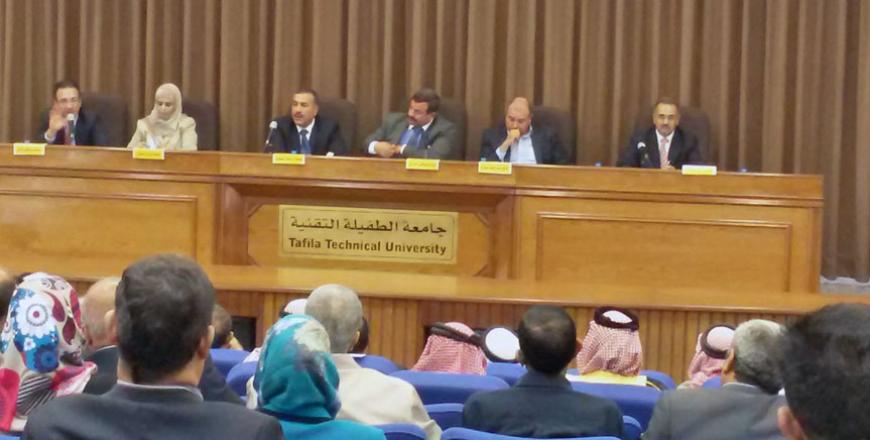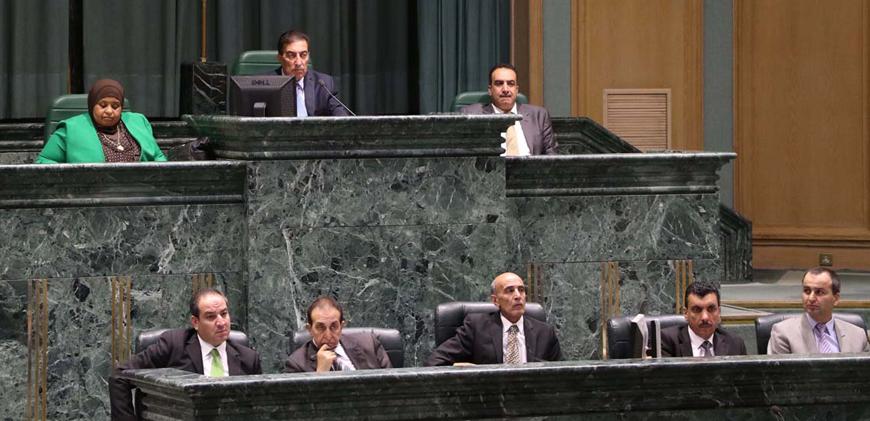You are here
Experts, House legal panel clash on legality of elections bill
By Raed Omari - Oct 20,2015 - Last updated at Oct 20,2015

Members of the Lower House Legal Committee meet with residents of Tafileh Governorate, some 180km southwest of Amman, last Wednesday to discuss the draft elections law (Petra photo)
AMMAN — While constitutional experts were criticising the 2015 draft parliamentary elections law as replete with “constitutional flaws”, the Lower House’s Legal Committee said it is meaningless to attack a bill that will inevitably be subject to modification.
Without giving names, Mustafa Amawi, head of the committee, expressed dismay over what he described as “negative, destructive and pointless” criticism of the bill by some legal and constitutional experts, saying: “These people only criticise for the sake of criticism.”
Attending a recent brainstorming session organised by the Legal Committee, constitutional expert Mohammad Hammouri said that deciding the number of parliamentary seats for each constituency by virtue of a bylaw, which is enacted by the government without the need to refer it to Parliament, is “unmistakably unconstitutional”.
Hammouri explained that dividing constituencies and defining the number of parliamentary seats is a matter that “has to do with public rights over which the government should not have the final say”.
Citing articles 114 and 120 of the Constitution, Hammouri said the Cabinet issues bylaws and regulations on matters of executive nature such as the establishment of government departments, the control of expenditures, public funds and appointments.
Paragraph A of Article 8 of the elections law reads: “The Kingdom is to be divided by a bylaw into electoral districts for which 130 parliamentary seats will be allocated.”
“The division of electoral districts and the number of parliamentary seats should be mentioned in the elections law,” the pundit said.
Hammouri also explained that the open proportional list mentioned in Paragraph A of Article 9 of the bill contradicts the “general direct election” principle, citing Article 67 of the Constitution which reads: “The Chamber of Deputies shall consist of members elected by secret ballot in a general direct election and in accordance with the provisions of an electoral law.”
“The open proportional list is a form of indirect election,” he said.
“According to Article 6 of the Constitution, all Jordanians are equal before the law. There is nothing called ‘positive discrimination’,” he added, stressing what he perceives as the “unconstitutionality of the quota system” stipulated in the draft elections law.
Paragraph A of Article 6 reads: “Jordanians shall be equal before the law. There shall be no discrimination between them as regards to their rights and duties on grounds of race, language or religion.”
“If they want to give special rights for special people, they should include this in the Constitution, as is the case in Switzerland and Norway,” Hammouri said.
In previous remarks to The Jordan Times, Omar Jazi, a law professor and established lawyer, explained that banning the citizens of the badia from running for parliamentary elections outside their designated constituencies is “unconstitutional”, also citing Article 6 of the Constitution.
Paragraph B, Article 8 of the keystone reform law deals with the northern, central and southern badia districts as a governorate for purposes of election administration.
Jazi said that under the new law, and unlike citizens from Amman, Irbid, Zarqa and other areas, the citizens living in, or originally from, the badia are not allowed to register candidacy outside their districts.
President of Legislative and Opinion Bureau Nufan Ajarmeh disagreed with Hammouri, explaining, in a recent meeting with the Legal Committee, that the legality of issuing bylaws and regulations related to the division of electoral districts and the allocation of parliamentary seats is covered in Article 31 of the Constitution.
According to the said article: “The King ratifies the laws and promulgates them. He shall direct the enactment of such regulations as may be necessary for their implementation, provided that such regulations are not inconsistent with the provisions thereof.”
Attending the same session, Minister of Political and Parliamentary Affairs Khaled Kalaldeh said that the 2015 elections bill has been spared the criticism that has traditionally been directed at previous electoral laws, such as weak representation of certain segments of society and undermining the social fabric of the nation.
“There is no election law without flaws. However, the electoral formula suggested in the 2015 draft elections law is the least negative and harmful,” Kalaldeh said.
Acknowledging some of the notes made by constitutional experts on the law, Amawi said: “Our disagreement with them is on the way their criticism is directed. They just criticise publicly on satellite channels and lectures here and there. Why do they not help us instead?”
However, Amawi, who holds a PhD in law, criticised the “authoritarian attitude” of some constitutional experts, saying, “They speak as if they know and we do not.”
“As a head of the Legal Committee and with a PhD in the constitutionality of laws, there is no way I would send a bill with suspicion of unconstitutionality to the House.”
He said that the committee is still in the process of discussing the draft law with all segments of society, adding: “All comments we hear from political figures, constitutional experts, professional associations, civil society organisations, and women and youth organisations will be taken into consideration.”
“It is still too early. The draft law will not even be given urgent status in the upcoming ordinary session. The law will not be deliberated [under the Dome] before February.”
Related Articles
AMMAN — The 2015 parliamentary elections law is not expected to be finalised during the current extraordinary session, head of the Lower Hou
AMMAN — MPs were divided on Sunday over the 2015 parliamentary elections bill with some calling for sending it back to the government, while
AMMAN — The Cabinet on Monday endorsed amendments to five articles of the Constitution, one of which allows dual nationality for occupiers o















